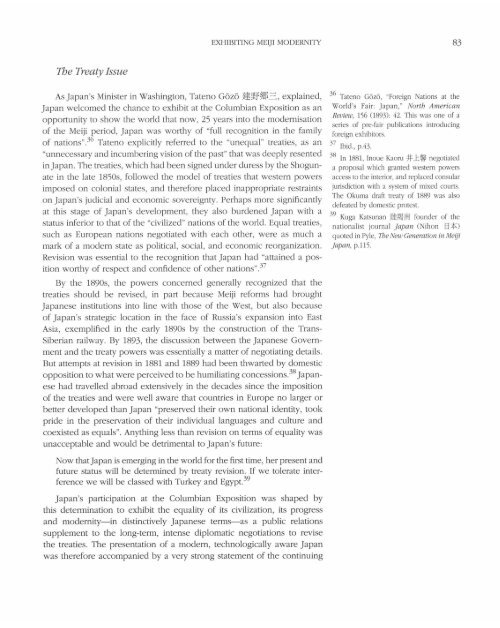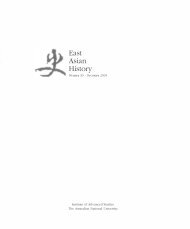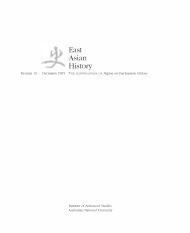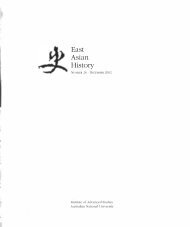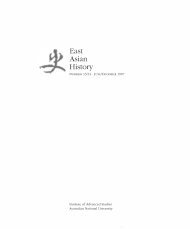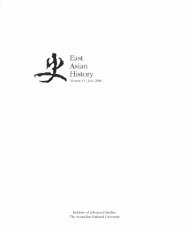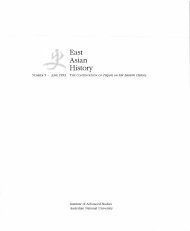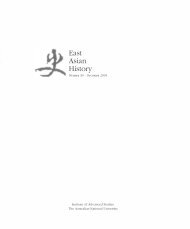Exhibiting Meiji Modernity: Japanese Art at the ... - East Asian History
Exhibiting Meiji Modernity: Japanese Art at the ... - East Asian History
Exhibiting Meiji Modernity: Japanese Art at the ... - East Asian History
- No tags were found...
Create successful ePaper yourself
Turn your PDF publications into a flip-book with our unique Google optimized e-Paper software.
EXHIBITING MEIJI MODERNITY<br />
83<br />
The Tre<strong>at</strong>y Issue<br />
As Japan's Minister in Washington, T<strong>at</strong>eno Gozo JlJ:Hft~ = , explained,<br />
Japan welcomed <strong>the</strong> chance to exhibit <strong>at</strong> <strong>the</strong> Columbian Exposition as an<br />
opportunity to show <strong>the</strong> world th<strong>at</strong> now, 25 years into <strong>the</strong> modernis<strong>at</strong>ion<br />
of <strong>the</strong> <strong>Meiji</strong> period, Japan was worthy of "full recognition in <strong>the</strong> family<br />
of n<strong>at</strong>ions".36 T<strong>at</strong>eno explicitly referred to <strong>the</strong> "unequal" tre<strong>at</strong>ies, as an<br />
"unnecessary and incumbering vision of <strong>the</strong> past" th<strong>at</strong> was deeply resented<br />
in Japan. The tre<strong>at</strong>ies, which had been signed under duress by <strong>the</strong> Shogun<strong>at</strong>e<br />
in <strong>the</strong> l<strong>at</strong>e 1850s, followed <strong>the</strong> model of tre<strong>at</strong>ies th<strong>at</strong> western powers<br />
imposed on colonial st<strong>at</strong>es, and <strong>the</strong>refore placed inappropri<strong>at</strong>e restraints<br />
on Japan's judicial and economic sovereignty. Perhaps more significantly<br />
<strong>at</strong> this stage of Japan's development, <strong>the</strong>y also burdened Japan with a<br />
st<strong>at</strong>us inferior to th<strong>at</strong> of <strong>the</strong> "civilized" n<strong>at</strong>ions of <strong>the</strong> world. Equal tre<strong>at</strong>ies,<br />
such as European n<strong>at</strong>ions negoti<strong>at</strong>ed with each o<strong>the</strong>r, were as much a<br />
mark of a modern st<strong>at</strong>e as political, social, and economic reorganiz<strong>at</strong>ion.<br />
Revision was essential to <strong>the</strong> recognition th<strong>at</strong> Japan had "<strong>at</strong>tained a position<br />
worthy of respect and confidence of o<strong>the</strong>r n<strong>at</strong>ions". 37<br />
By <strong>the</strong> 1890s, <strong>the</strong> powers concerned generally recognized th<strong>at</strong> <strong>the</strong><br />
tre<strong>at</strong>ies should be revised, in part because <strong>Meiji</strong> reforms had brought<br />
<strong>Japanese</strong> institutions into line with those of <strong>the</strong> West, but also because<br />
of Japan's str<strong>at</strong>egic loc<strong>at</strong>ion in <strong>the</strong> face of Russia's expansion into <strong>East</strong><br />
Asia, exemplified in <strong>the</strong> early 1890s by <strong>the</strong> construction of <strong>the</strong> Trans<br />
Siberian railway. By 1893, <strong>the</strong> discussion between <strong>the</strong> <strong>Japanese</strong> Government<br />
and <strong>the</strong> tre<strong>at</strong>y powers was essentially a m<strong>at</strong>ter of negoti<strong>at</strong>ing details.<br />
But <strong>at</strong>tempts <strong>at</strong> revision in 1881 and 1889 had been thwarted by domestic<br />
opposition to wh<strong>at</strong> were perceived to be humili<strong>at</strong>ing concessions. 38 <strong>Japanese</strong><br />
had travelled abroad extensively in <strong>the</strong> decades since <strong>the</strong> imposition<br />
of <strong>the</strong> tre<strong>at</strong>ies and were well aware th<strong>at</strong> countries in Europe no larger or<br />
better developed than Japan "preserved <strong>the</strong>ir own n<strong>at</strong>ional identity, took<br />
pride in <strong>the</strong> preserv<strong>at</strong>ion of <strong>the</strong>ir individual languages and culture and<br />
coexisted as equals". Anything less than revision on terms of equality was<br />
unacceptable and would be detrimental to Japan's future:<br />
Now th<strong>at</strong>Japan is emerging in <strong>the</strong> world for <strong>the</strong> first time, her present and<br />
future st<strong>at</strong>us will be determined by tre<strong>at</strong>y revision. If we toler<strong>at</strong>e interference<br />
we will be classed with Turkey and Egypt. 39<br />
Japan's particip<strong>at</strong>ion <strong>at</strong> <strong>the</strong> Columbian Exposition was shaped by<br />
this determin<strong>at</strong>ion to exhibit <strong>the</strong> equality of its civiliz<strong>at</strong>ion, its progress<br />
and modernity- in distinctively <strong>Japanese</strong> terms- as a public rel<strong>at</strong>ions<br />
supplement to <strong>the</strong> long-term, intense diplom<strong>at</strong>ic negoti<strong>at</strong>ions to revise<br />
<strong>the</strong> tre<strong>at</strong>ies. The present<strong>at</strong>ion of a modern, technologically aware Japan<br />
was <strong>the</strong>refore accompanied by a very strong st<strong>at</strong>ement of <strong>the</strong> continuing<br />
36 T<strong>at</strong>eno Gozo, "Foreign N<strong>at</strong>ions <strong>at</strong> <strong>the</strong><br />
World's Fair: Japan," North American<br />
Review, 156 (1893): 42. This was one of a<br />
series of pre-fair public<strong>at</strong>ions introducing<br />
foreign exhibitors.<br />
37 Ibid, p.43.<br />
38 In 1881, Inoue Kaoru it -.t'ii\l negoti<strong>at</strong>ed<br />
a proposal which granted western powers<br />
access to <strong>the</strong> interior, and replaced consular<br />
jurisdiction with a system of mixed COllitS.<br />
The Okuma draft tre<strong>at</strong>y of 1889 was also<br />
defe<strong>at</strong>ed by domestic protest.<br />
39 Kuga K<strong>at</strong>sunan I~m m founder of <strong>the</strong><br />
n<strong>at</strong>ionalist journal japan (Nihon EI :


